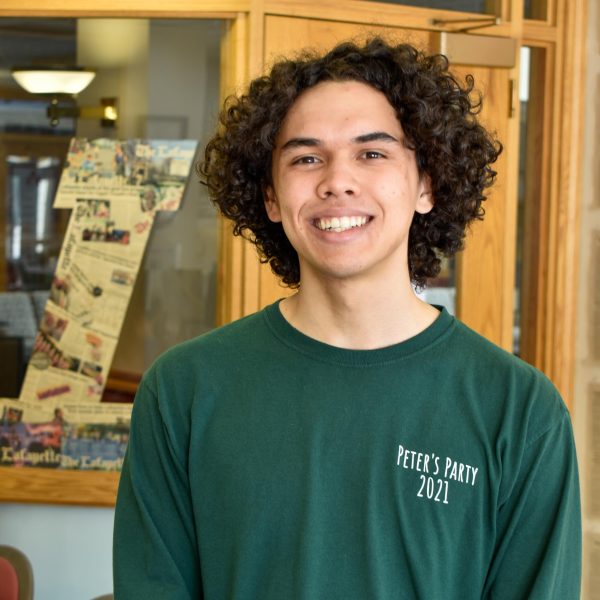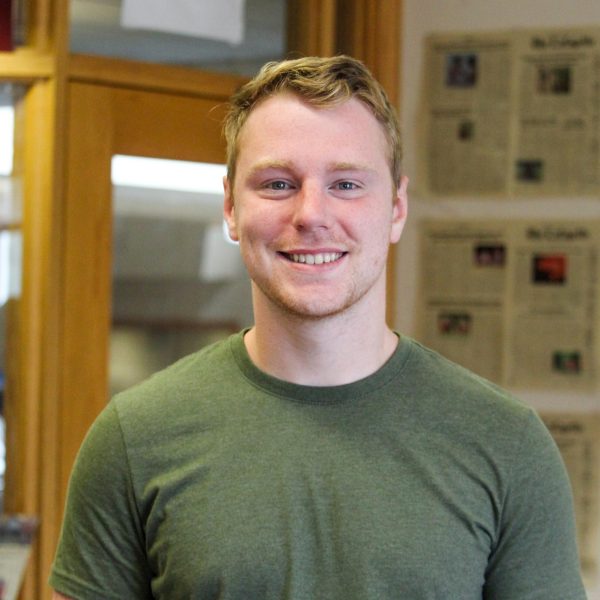A motion to approve the final draft of Lafayette College’s mission and values statement was withdrawn after a contentious 45-minute debate at last Tuesday’s faculty meeting. The withdrawal followed a separate vote the week prior by the college’s administrative staff, which approved the measure by a 172-2 margin.
Critics of the statement said that it devalued the role of academics in the student experience, including by equating faculty with staff in the cultivation of an “undergraduate learning environment” and labeling athletics as a “co-curricular pursuit” equal to academics, as opposed to an extracurricular activity.
“I would like to see a focus on what the college’s primary mission is, which is to educate people,” said economics professor Susan Averett, an opponent of the measure.
The debate began after college President Nicole Hurd introduced the draft statement to the faculty. According to Joshua Smith, the clerk of the faculty, the faculty members of the committee tasked with drafting the statement “presented a motion to recommend to the Board of Trustees that the Trustees adopt the proposed Mission and Values statements.”
History professor Joshua Sanborn was the first to speak. Using prepared remarks sprinkled with ad-libs, Sanborn implored his colleagues to consider the ancient history of academia in casting their votes.
“The draft that they had proposed, in my mind, it didn’t center what I have taken to be the central mission of higher education for the last 1,000 years, which is the relationship between faculty and students, production of knowledge, intellectual exchange and mentorship between faculty and students,” Sanborn said in an interview.
“All the other things that happen at contemporary higher education institutions are really important, and I think we need them,” Sanborn added, citing dining and athletics, “but they’re not the central mission of the college.”
Of nearly a dozen professors interviewed by The Lafayette, almost all agreed with Sanborn, including English professor Chris Phillips, who spoke in favor of the measure because he believed it to be workable, if a bit lengthy.
“We have so much going on in athletics, we have so many teams and lots of students participating in that at the club level as well as the NCAA level,” Phillips said. “I think that is something for us to be proud of. Does that define who we are or is that kind of one nice option that is a subset of who we are?”
Some faculty members criticized the forums available to suggest edits to the statement – online surveys and open meetings they did not have time to attend, which Hurd defended in an interview as an “inclusive” process. Despite this, faculty members widely acknowledged the statement revision process as thorough.
“So why the controversy?” Caroline Lee, a sociology professor who spoke in opposition to the statement, asked in an email. “The mission and values statements that resulted from all the consultant-speak and compulsions to please everyone didn’t read like a liberal arts mission statement in form or content.”
These attempts to “please everyone,” according to critics, could be seen in the statement’s description of a learning environment that “strives for equity and inclusion alongside diversity of thought and ideas.”
“The language and practice of the newfangled term ‘thought diversity’ (delivered in the past through events such as the Mill Series) was not favorably received on campus,” wrote Angelika von Wahl, an international affairs professor and former chair of the faculty diversity committee, in an email. “Academic freedom is a better term.”
Dru Germanoski, a geology professor who serves on the committee that drafted the statement, wrote in an email that he had hoped the measure would pass, though he acknowledged that there are “opportunities to improve the mission statement measurably.”
“I can say that I found some of the comments/criticisms helpful, especially when they addressed the actual language in the document,” Germanoski wrote. “I can also say that I predict that we will be able to address much of what we heard in a manner that will be satisfactory to people.”
When Averett asked her colleagues at the faculty meeting what would happen if the measure failed to pass, Hurd suggested that the motion be withdrawn.
“She assured us that she was going to take it back to the drawing board,” Averett said of Hurd.
The withdrawal of the motion scuttled plans for Student Government and the board of trustees to approve it during meetings in the intervening week.
In an email to the faculty obtained by The Lafayette, Hurd advertised two meetings for faculty to suggest revisions, one on Monday open to all professors and another on Thursday open only to tenured faculty.
In an email to The Lafayette sent after this article’s publication, Nicole Eramo, Hurd’s chief of staff, wrote “the one on Monday is actually restricted to pre-tenured, adjunct, and visiting faculty and the one on Thursday will be open to all.”
Faculty members hope to have the statement finalized by the end of the academic year, a timeline Hurd agreed was feasible.
Editor’s note: This article has been updated to include information sent to The Lafayette after its publication.

























































































































Jim Doughty '90 • Apr 24, 2024 at 4:13 pm
From afar and many years removed from active attention to campus events, I’m catching up on this issue — thank you, newspaper staff.
Whatever other changes the college makes to this statement before another vote, would someone run it by the English Department? The draft linked here is a child’s garden of passive voicing and shake-out-the-thesaurus modifiers — which, apart from the writing sins involved, signal mushy institutional thinking. The aim here should be to specify and distill.
– “Innovative creativity” — better than the other kind, agreed.
– “Holistically flourish”? You mean something by that. Say what you mean.
– “Empathetic learners who care for one another” — sure, both of those things.
Then there’s: “…where the interplay among the arts,
engineering, humanities, natural sciences, and social sciences are fostered by faculty and staff…” The subject of the verb “foster” is the singular noun “interplay.” It should read “is fostered,” not “are.” (Before, that is, a further edit to remove the passive voice.)
As Norman Maclean said: “Half as long.”
As Magneto said: “I thought you lived at a school.”
Eric Malm ('88) • Mar 5, 2024 at 8:45 pm
When I entered Lafayette in 1984, I got a D on my first Freshman English paper- followed by a C- and a C. Yet somehow I didn’t run away from the subject, and instead graduated as an English minor. For some reason my reaction was to learn to be a better writer. During my Junior year I was asked to be a writing tutor for the Business Department, and also volunteered to be a literacy tutor at Northampton County Prison. Eventually I got a Ph.D. in Economics and was the first in my cohort to graduate- due to my writing, not my math skills. I’m currently a college professor and enjoy teaching writing within my Economics classes.
What does this have to do with a Mission Statement? In my experience, Lafayette provided an atmosphere of experimentation and inquiry. As a good liberal arts education should do, I expanded my boundaries without a great concern for grades or marketability. At the time I felt like I had ‘learned how to learn’. While supportive and challenging faculty played an important part, there were many other staff and community members who also played important (while less visible) roles. It takes a village, or an entire community to produce a well-rounded education. It will be up to the entire community to determine whether the draft Mission Statement is true to what a Lafayette education is today, and what it might look like in the future.
Mark Lafayette • Mar 1, 2024 at 11:27 am
This is yet another rushed short-sighted attempt by Hurd. First 172 does not cover even half of the administrative staff on campus and was a rushed vote without enough time to digest the information presented. There wasn’t enough time to digest the sorry excuse that Parkhurst calls breakfast either.
Second, it’s apparent she is a lame-duck president and that the Board of Trustees are trying to save face with their poor choice. What is best for the college is for Hurd’s contract to not be renewed and for a new search to start as soon as possible for real leadership.
How many more need to take part in the exodus on campus before we realize why everyone is leaving.
George Class of 94 • Mar 2, 2024 at 10:53 am
Academia would have you believe they are the bastion of diversity and inclusion. Lord knows they are quick to virtue signal and tell everyone else how to live. Introduce diverse ideas to them, however, and it’s “new fangled” thinking not aligned with the way things have happened for the last “1,000” years. Unreal. President Hurd is the breath of fresh air Lafayette has longed for for decades. Stay strong Madame President!
William Rappolt • Mar 4, 2024 at 8:15 am
President Hurd has brought reasoned purpose to Lafayette. When our seniors graduate this spring they will be only qualified to continue their education. None will be qualified to be a brain surgeon, lawyers or even college professors!!
An undergraduate institution provides a safe place to experiment in a variety of areas and learn from others. Our students come to us with diverse talents and interests. Many of those talents are beyond just the classroom.
We owe it to our students to provide a quality opportunity to mature in that environment. Yes an environment of “and.”
I am acquainted with many on the BOT and as a former member of that Board and as an alumnus I can assure you she has their full confidence. Continue on President Hurd!!!